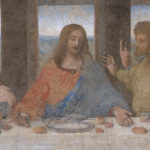
It is clear from Scripture that God chose to use language as an important, even vital, form to communicate with mankind relative to virtually everything necessary to life. Moses was ordered to write information, for blessing or cursing, so that history would testify of God to unborn generations. The reference in Exodus 17 is to record the destruction of the Amaleks so to document that God is willing to permit warfare as society chooses it. Mankind, even in common grace from God, is prone to use warfare to resolve differences. If that is our way we will have it. God permits some folly. It is likely that his involvements reduce some horrors. He will have a kingdom where there will… Read more







